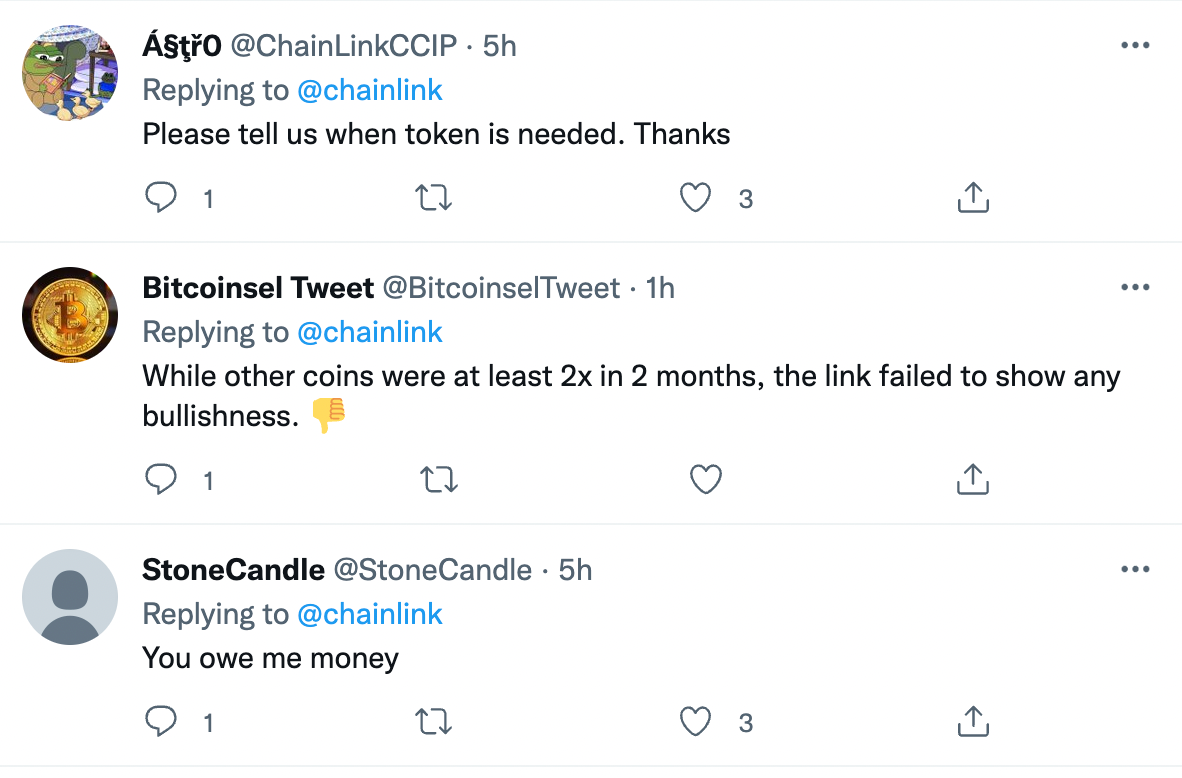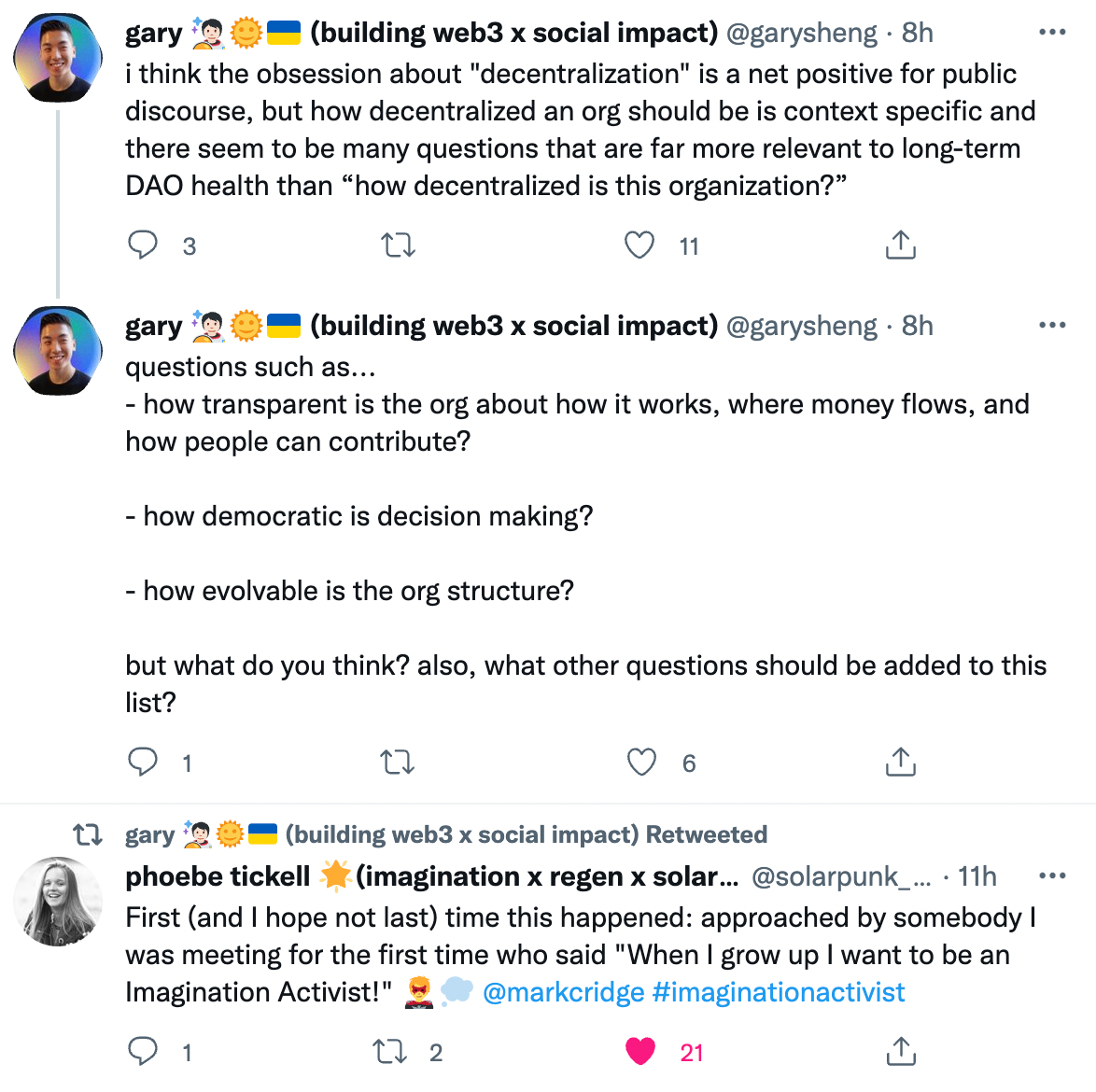What this guide is: Short, quick reference guide for beginners to web3 who are interested in learning how this technology can be used to create positive social impact.
What this guide is not: Detailed. Descriptions are kept purposely short and simplistic to not overwhelm. Also not exhaustive; only includes most commonly used terms/tools that you’ll need to know to get started. If anything catches your attention, dive deeper by clicking on the links accompanying each item, or in the “Additional Resources” section. Contrary to popular belief, you don’t need to understand the technical details of the technology to begin participating in the space.
Definitions
web3: The next iteration of the internet enabled by blockchain technology. Allows users to have ownership in the protocols they interact with; summarized in this tweet:

Crypto: Short for “cryptocurrency”; technically this refers to coins/tokens, but is also generally used as a broader name for the space, as an alternative to web3. Some purists will say it’s the only name.
Blockchain: The base-layer technology that the web3 space is built on. The most commonly used blockchain is Ethereum, and its native token is ETH. Other blockchains include Celo, Solana, Bitcoin.
Degen: Short for “degenerate”. Refers to the people/culture of engaging in high-risk trading with the goal of making a quick profit. The majority of the crypto/web3 space (certainly of media coverage of the space) consists of this type of user. Degens often choose to stay anonymous. Examples of degen activities include (but aren’t limited to) shilling your bags (the tokens you hold), flipping NFTs, and joining a DAO because you believe its token price is going to go up. Related memes include “number go up”/ “up only”.

Regen: Short for “regenerative”. A meme-ified term created in response to the mainstream “degen” culture in web3. Refers to the people/culture of using blockchain technology for social/environmental good. Regens are most often not anonymous (aka “doxxed”). Examples of regen activities include reimagining systems and building new ones, with the goal of regenerating the environment/social connection. Related memes include “solarpunk”, a high-tech utopian imagination of the future.

TradFi/DeFi/ReFi: TradFi = traditional finance (eg banks, stock market); DeFi = decentralized finance (eg decentralized crypto exchanges, crypto-based lending/borrowing products); ReFi = regenerative finance (eg impact investing, using capital to generate positive social/environmental change).
NFT: Non-Fungible Token. Represents a unique asset on the blockchain. Has many use cases beyond monkey profile pictures and ugly “art” being sold for millions of dollars (see “degen”).
DAO: Decentralized Autonomous Organization. Often neither truly decentralized nor autonomous, however (most) do hold these values as core to their operation. Can be described as “digital co-ops”, or “group chats with a shared bank account”.
Tools
Wallet: Where you hold your crypto assets, including social tokens which act as memberships to many communities. Also used as a sign-up tool, required for engaging with many web3 applications. The most popular wallet for app integration is Metamask. Wallet hygiene + security is the most important technical topic to learn before diving too deep into the space. Here is a good primer.
Discord: An aptly-named messaging platform that most DAOs/web3 projects have adopted as their main internal communications tool. Each Discord “server” is divided up into a number of “categories” and then “channels”, which can be “token-gated” i.e. require ownership of certain tokens/NFTs to access.
Twitter: The preferred social media platform of web3. Essential for keeping up with trends and building clout/social capital in the space. People will respect you based on how many followers you have. When choosing who to follow on Twitter, I try to minimize noise and only follow people who post interesting content (and the occassional shitpost). This may vary depending on your preferences. Experiment with the “Lists” feature to further refine your feed. Quality > quantity.
Discourse: A forum tool where more serious governance-related discussions take place before a proposal is put up for vote.
Snapshot: A tool for voting on governance proposals.
Notion: A collaborative note-taking tool that is more aesthetically pleasing and offers better functionality/interoperability than Google Docs.
Miro: A digital whiteboard, often used for collaborative brainstorming sessions.
Butter: A video conferencing platform. Like Zoom, but way better.
Mirror: A web3-native publishing platform that allows publications to be turned into NFTs for fundraising or other purposes.
Prominent Organisations
Gitcoin: A DAO with a mission to support and fund digital public goods. They have positioned themselves as currently the largest “regen”-focused DAO, and played an important role in popularising regen culture in the space. Here is a good primer on who they are and what they do.
DreamDAO: An intergenerational organization equipping proven Gen Z civic innovators with web3 tools for creating positive social impact. Heavy on solarpunk values and imagery.
Protein: An organisation focused on creating regenerative impact in the culture space, through their “Good Growth” framework.
Celo: A carbon-negative blockchain designed for inclusion, focused on regen use-cases for crypto. Excellent deep-dive here.
Toucan Protocol: Provides web3 building blocks for a regenerative economy by bridging carbon credits onto a public blockchain
Regen Network: Facilitates the creation of new ecological assets for use in ReFi. Similar to Toucan, but on the Cosmos blockchain instead of Ethereum.
ReFi DAO: A DAO of regen-focused DAOs.
Prominent Individuals
Note: This list highlights spokespeople and those most publicly vocal in the space. As such, it doesn’t include many other thoughtful builders who may be just as/more engaged, but less active on Twitter. The hope is that these accounts will help you discover many others in the space.
Gary Sheng: Co-founder of Dream DAO. Passionate regen advocate and relationship-builder in the space. Seems to know everyone.
Julie Owono: An academic and leader in the space of digital rights advocacy.
Audrey Tang: Digital Minister of Taiwan; another outspoken advocate for digital rights and freedoms, and using technology for social/environmental good.
Ale Borda: As solarpunk/regen as they get; a visionary DAO cartographer, mapping out the regen-DAO landscape. More information on Impact Cartographers here.
Madison Adams: Another brilliant young advocate of web3 x social impact.
Carl Cervone: Talks crypto x climate, and advocate for creating better onboarding to the space.
Dave Kim: One of few with a strong background and experience in social impact prior to web3. Doesn’t put the cart before the horse. Founder of Future Foundation.
Kevin Owocki: Co-founder and main spokesperson of Gitcoin.
Scott Moore: Also co-founder of Gitcoin. Posts cool art on his Twitter.
Phoebe Tickell: Imagination activist, co-creator of RenaissanceU.
Madamcultleader: Prominent critical voice and DEI advocate.
Austin Robey: Strong advocate for a collectively-owned creator economy.
Bigger list here.
Additional Resources
- a16z’s DAO Cannon that lists articles covering many aspects of DAOs
- Gitcoin’s Public Goods Starter Pack
- Towards a Digital Pluriverse
- This tour through the crypto x climate rabbit hole
- A list of DAOs working on social/environmental impact
- RenaissanceU
- Madison’s tweets.
- How to DAO from Day 1
- This guide to web3 for non-technical roles
- This library of web3 that links to many other great resources
Thanks to the DreamDAO community for their input in helping make this guide as user-friendly as possible!
